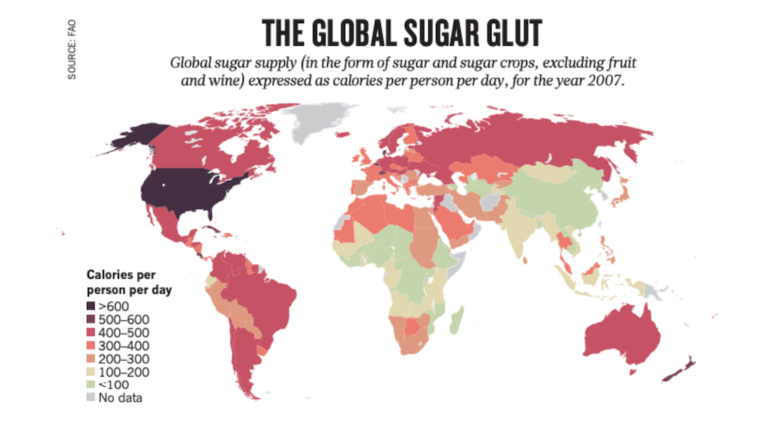Question: What is the basis for arguments to restrict sugar consumption?
Takeaway: Robert Lustig, Laura Schmidt, and Claire Brindis argue sugar is not merely toxic but ubiquitous, potentially abuse-forming, and detrimental to society; taken together, these conditions justify aggressive action to reduce sugar consumption.
In this 2012 commentary in Nature, Robert Lustig, Laura Schmidt, and Claire Brindis claim sugar harms individuals and society in similar ways to tobacco and alcohol. They argue similar measures to restrict its consumption are warranted.
According to United Nations data (1), 2011 was the first year in recorded history when noncommunicable disease mortality exceeded that of infectious disease. Obesity and metabolic disease have spread to lower- and middle-income countries. Now, a larger share of the worldwide population is obese rather than malnourished, and 80% of deaths are attributable directly or indirectly to obesity and poor metabolic health. Rates of these diseases have increased over the past 50 years alongside a three-fold increase in the consumption of added sugars.
Thomas Babor, writing on alcohol in 2003, established four criteria that justified regulation of a commodity: unavoidability, toxicity, abuse potential, and a negative impact on society (2). Lustig et al. argue sugar meets these criteria.
Sugar is ubiquitous in our current processed-food-rich environment, as it can be found in nearly all processed foods (3). The figure below outlines mean daily sugar consumption by country; consumption in many countries exceeds 300 calories per day.
Increasingly robust evidence indicates sugar is uniquely toxic and is not merely “empty calories” but instead specifically deleterious to health (4). Fructose is directly toxic to the liver, having similar effects to alcohol; increased sugar consumption has been linked to fatty liver disease, impaired liver health, hypertension, diabetes, insulin resistance, heart disease, and other associated conditions.

Animal and human data suggest sugar has significant abuse potential, with sugar consumption encouraging additional sugar consumption (5). Sugar simultaneously increases consumption of all foods by impairing the normal hormonal response to food intake.
Finally, sugar negatively impacts society by directly and indirectly contributing to billions in annual health-care spending, with 75% of U.S. health care dollars spent treating chronic diseases and their consequences (6).
Given these observations, Lustig, Schmidt, and Brindis argue there is sufficient basis for systemic efforts to reduce sugar consumption, which may include taxation, availability restrictions (e.g., making illegal the sale of sugar-containing beverages to minors), or other measures similar to those used to reduce alcohol and tobacco consumption.
Notes
- Source not provided in original text
- Alcohol: No ordinary commodity: Research and public policy
- Food policy for developing countries: Case studies
- Joint WHO/FAO expert consultation. Diet, nutrition and the prevention of chronic diseases; Fructose: metabolic, hedonic, and societal parallels with ethanol; Fructose and metabolic diseases: New findings, new questions
- Is fast food addictive?
- National medical spending attributable to overweight and obesity: How much, and who’s paying?
Comments on The Toxic Truth About Sugar
Use the knowledge to benefit the health of yourself, your families, and those close to you. The strongest, smartest, most diligent have always been more successful. It's not up to government to regulate what is good for you!
I’m of mixed minds on this. The libertarian in me wants to keep the government out of my diet as much as possible. However, it’s hard to observe the health devastation around me and not want to do something. Taxes on sugar sweetened beverages have been tried in a few places. Berkeley, CA placed a 2 cent/oz tax on sugary drinks. Seattle did the same. In both cases consumption dropped by around 20%. Of course, coffee beverages were exempt even though Starbucks drinks can be massive sugar bombs. The argument was that it would place a heavy burden on coffee shops to account for every shot of syrup. Then why not tax the syrup? For soda dispensers, they taxed the syrup so there is precedent for this. I think politicians just like their caramel frappuccinos too much.
Some cities tried to disallow sugary foods from food stamp programs, but were shut down by the USDA. That’s unfortunate. Poor people have less access to healthy options in a lot of areas. If they couldn’t spend food stamps on junk food, I’m sure healthier options would find their way into the food deserts.
A good start might be to stop subsidizing food crops that turn into junk food. Corn, wheat and soy being good examples. We already placed an import tax on cane sugar. But this was mainly just a protectionist measure for our farmers. Corn syrup was an easy replacement for cane sugar.
I completely agree. I don’t think the first step is to tax or ban any products. That could lead to banning or taxing of other things the government thinks is unhealthy, such as red meat. And they do not have a great track record of knowing what is and isn’t healthy for us. But decreasing farm subsidies would be a great first step. Also, actually looking at the totality of the evidence when creating government guidelines (or just decreasing the impact of these guidelines altogether) could move us in a better direction as well. Luckily they are continuing to recommend less sugar, but when you also decrease fat intake to such a low level food becomes bland and people don’t want it. So they end up overeating anyway, and most likely they reach for the sugary/processed foods even though they know it isn’t good for them.
The Toxic Truth About Sugar
3